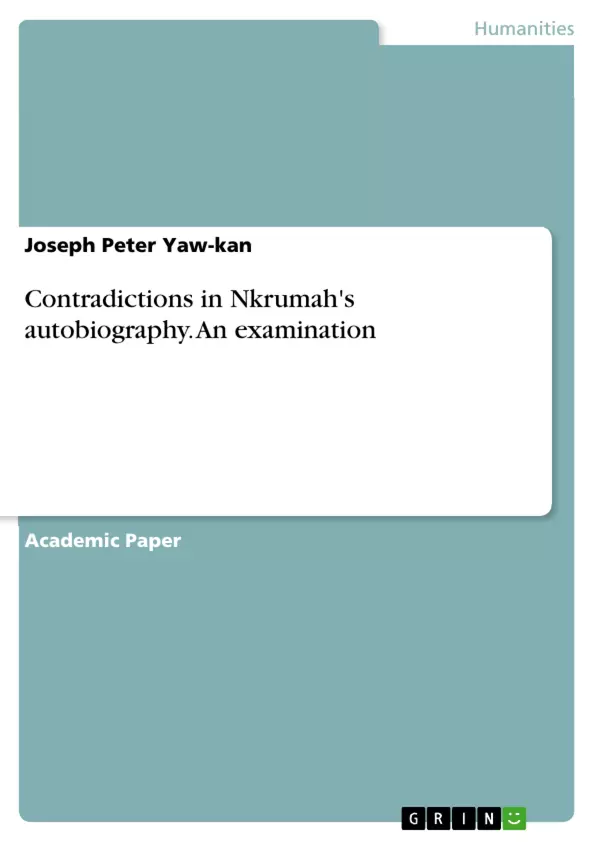This paper proposes to examine the issue of contradictions in Nkrumah's narrative. Among the many contradictions, emphasis will be placed on Nkrumah’s sudden admiration for the colonial master he has been fighting all this while, the essence of which is to look at the character of Nkrumah, his attitude in relation to his touted “messianic mission.”
The existing critical reception of the beautifully written personal account of Kwame Nkrumah, does appear to overlook the essentiality of the contradictions in his language use. The autobiographical ideology that, in fact, language has a way of betraying itself or giving itself a certain measure of truth and meaning is at the heart of autobiographical proper. The narrative of Nkrumah reflects both his life and his struggle for independence for Ghana. From the word go, Nkrumah creates an impression on the mind of the reader to consider either to detach himself with the truth of the narrative or to continue to identify with it.
Kwame Nkrumah was born on 21st September, 1909 in the village of Nkroful in Nzima-Ghana. Arguably, Nkrumah was seen as the founder of the then Gold Coast – Ghana. Through his efforts, Ghana attained independence from British Colonial Imperialism on the 6th of March, 1957. Nkrumah certainly became Ghana’s first president of the Republic having served as a prime minister un the British Monarchical Regime. The contributions of Nkrumah towards Ghana’s Independence cannot be overlooked. With much opposition from his people at the time, Nkrumah, through the Conventions People’s Party (CPP) formed the first government. Coincidentally, his autobiography was published on the same year Ghana attained her Independence. This was perhaps the more reason it was first titled: Ghana: The Autobiography of Kwame Nkrumah.
Inhaltsverzeichnis (Table of Contents)
- ABSTRACT
- 1.0 INTRODUCTION
- 2. METHODOLOGY
- 3. BACKGROUND TO NKRUMAH AND HIS AUTOBIOGRAPHY
- 4. RESULTS AND DISCUSSIONS
- 5 CONCLUSION
- REFERENCES
Zielsetzung und Themenschwerpunkte (Objectives and Key Themes)
This paper aims to explore the contradictions present in Kwame Nkrumah's autobiography, particularly focusing on the inconsistencies in his language use and the impact these have on his character. The analysis seeks to shed light on the challenges of interpreting autobiographical narratives and the potential for self-contradiction in personal accounts.
- Contradictions in autobiographical narratives
- The role of language in shaping personal narratives
- The nature of truth and authenticity in autobiography
- The interplay between ideology and personal experience
- Nkrumah's character and his "messianic mission"
Zusammenfassung der Kapitel (Chapter Summaries)
- 1.0 INTRODUCTION: This chapter begins by examining the ongoing debate surrounding the definition of autobiography, referencing works by Roy Pascal and Philippe Lejeune. It introduces the concept of contradictions in autobiographical narratives, arguing that such inconsistencies can challenge the reader's understanding of the text and the author's truthfulness.
- 2. METHODOLOGY: The chapter outlines the methodology employed for the study, which involves a descriptive qualitative research design and content analysis of Nkrumah's autobiography.
- 3. BACKGROUND TO NKRUMAH AND HIS AUTOBIOGRAPHY: This chapter provides a brief overview of Nkrumah's life and career, highlighting his role in Ghana's independence movement. It also discusses the context of his autobiography, its publication date, and the narrative structure.
Schlüsselwörter (Keywords)
The paper focuses on the following keywords: autobiography, contradictions, Kwame Nkrumah, language use, ideology, personal narrative, truth, authenticity, "messianic mission," Ghana.
- Quote paper
- Joseph Peter Yaw-kan (Author), 2020, Contradictions in Nkrumah's autobiography. An examination, Munich, GRIN Verlag, https://www.hausarbeiten.de/document/1133159


